For the Love of Mary (1948)

via: http://www.omcm.com/tcmdb/title/75342/For-the-Love-of-Mary/# Unless otherwise noted, all images are my own.
This movie is mostly famous as Deanna Durbin‘s final film before she retired from show business at the age of 26. Her youth at retirement belies her busy career–she made 21 feature films over twelve years starting when she was only fourteen.
Durbin was a charming young actress with operatic soprano pipes. Her voice was so mature that when she auditioned for Snow White (1937), Walt Disney thought her voice was “too old” for the role–she was fifteen!
She was a huge star in the late 1930s and mid-’40s, but by 1948 her box office appeal was waning along with her interest in show business. For the Love of Mary wasn’t supposed to be her final film, and Universal actually sued her a few months after production wrapped because she didn’t want to work anymore. But Durbin prevailed and this film earned the distinction of being her last. (For more on her career, visit my review of It’s a Date (1940).)
If it wasn’t for Durbin’s retirement, we may not remember this movie as much. It’s not the greatest, and much of the plot is laughable today and was silly even back then. The film is one farcical, almost screwball situation piled on top of another, but it’s not played as farce or screwball. It’s a fairly straight romantic comedy even though the plot is completely ridiculous. The characters accept the wackiness without realizing it’s crazy, so the audience is left unsure whether to laugh or nod along. Imagine if Cary Grant’s character in Bringing Up Baby (1938) never acted surprised, confused, or exasperated by the insanity happening around him. You need someone in the movie to acknowledge the farce:
I can imagine this movie being very different (and more enjoyable!) with Carole Lombard or Katharine Hepburn in the Durbin role opposite Joel McCrea or Cary Grant, with plenty of comedy deriving from the crazy plot. But instead the film downplays the farce and asks the audience to suspend our disbelief past the breaking point.
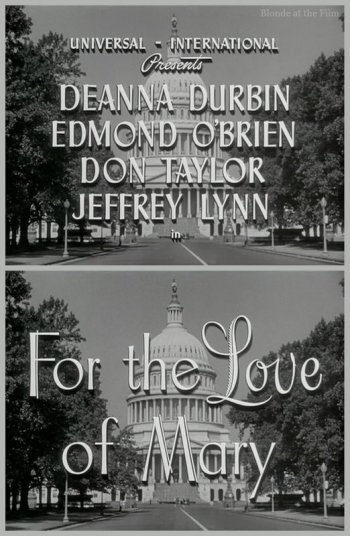
I realize I’ve just committed one of my pet peeves: when people don’t accept a movie for what it is and wish it was something different. So feel free to ignore my previous criticism and judge for yourself!
We begin with our leading lady driving her cute convertible through the (laughably open and minimally guarded) White House gates.
Mary Peppertree (Deanna Durbin) worked at the Supreme Court switchboard for years until she quit her job to marry a man named Phillip. But she called off the engagement a few days ago and asked to be re-assigned to the White House. Today is her first day, though since her father has worked as a security guard at the White House for decades, she knows everyone and everyone already knows her (and loves her, as we shall see!) (We get all this information in drips and drabs throughout the first scenes. It’s a real in medias res situation and we have to catch up.)
Her new boss Miss Harkness “Harky” (Katharine Alexander) gives Mary the welcome speech about her responsibilities as a White House operator. All calls to and from the White House go through the switchboard, so the operators must determine which calls are legitimate, connect people all over the world, track down requested officials and civilians, and of course always be diplomatic and discreet. They control the President’s private line and act as operator, assistant, and confidante to everyone in Washington. Harky’s speech is quite stirring and makes the job sound terribly important–it’s as though the government needed more switchboard operators and asked the screenwriters to insert an advertisement! (For more on vintage telephony and switchboards, visit my History Through Hollywood: Telephones.)
Mary might be new to the White House, but she is an old pro at the switchboard and gets right to it. Her first call is with a Mr. David Paxton (Don Taylor) who has been bugging the operators with his request to speak to the President about his fish. He sounds like a lunatic so they don’t let him through despite his constant attempts.
Once Mary gets rid of David, she stays busy fielding calls from Supreme Court Justices who are upset that she left her old job. Clearly she was a beloved “hello girl” (slang for operator). The Justices have another motive for calling besides begging her to return: they want Mary to get re-engaged to Phillip. It’s all very realistic: of course multiple judges on the highest court in the land would spend their time advising a former, low-level employee on her love life. Nothing inappropriate or strange about that!
All of these calls attract the attention of Harky, who asks Mary about her marriage plans. She explains that since White House operators are on call at all hours, they have a policy not to hire young married women. (Because naturally a wife’s only duty should be to her husband. Also, everyone knows their tiny brains can’t handle a job and a husband! That’s two things!)
Mary assures her boss that she’s not going to marry Phillip, and she promises to explain the situation to the various Justices that evening so that they won’t keep calling her.
After work, Mary meets her father for dinner at their usual restaurant, Gustav’s. It’s also the favorite hangout of the Supreme Court Justices, who think of Mary as a daughter/mascot. Oddly, there is no security anywhere despite the presence of multiple judges. Simpler time? Or simplified film?
Anyway, the Justices are currently helping Gustav (Hugo Haas) study for his citizenship test. (Another highly realistic situation.) Phillip is there, too. He’s an attorney with the Justice Department and a favorite of the judges. Mary handles the awkward situation with her ex-fiance beautifully. She even sings the restaurant a pretty tune. It is Deanna Durbin, after all!
After the song, Phillip (Jeffrey Lynn) tries to explain once again that the “date” Mary saw him on was actually business. The woman is a client, and there is nothing going on between them. He assumes that Mary called off the engagement because she thought he was two-timing her, but he’s wrong. She decided not to marry him because she didn’t feel any jealousy when she saw him with the other woman. She explains that she should feel something when she sees her fiancé with another lady, even if it turns out to be innocent, so the situation helped Mary realize that she was marrying Phillip out of habit, not because she loved him.
Fun fact: Lynn had begun acting in the 1930s and was the frontrunner for the part of Ashley Wilkes in Gone with the Wind (1939). He even performed most of the screen tests as Ashley during the nationwide search for Scarlett. But eventually Leslie Howard got the part.
Mary and Phillip’s conversation is interrupted by the crazy fish man, David Paxton. He overheard Mary complaining about his calls and comes over to give her a piece of his mind.
He says that he’s a fish scientist who is trying to study species near a particular island in the Pacific. The US Navy won’t give him access, so he is hoping the President can intervene. He’s not the lunatic Mary assumed he was, but he’s also rude and insulting, so she hopes never to see him again.
But the next day, David waits for Mary at the White House gates and tries to bribe her with flowers and chocolates in exchange for a conversation with the President. She throws the gifts back in his face and heads into work. The confrontation with David leaves her hiccuping at her switchboard. (When Mary is upset or emotional she gets the hiccups.)
To her embarrassment, she hiccups during a call with the President. He suggests a hiccup remedy–he’s a nice President–and a very, very involved employer. He sends his top secretary, Mr. Elwood (Ray Collins) to the switchboard room to make sure that Mary correctly attempts the hiccup cure. Then he calls back to check on the result! It’s an eventful morning.
 After the hiccup drama, Phillip calls to ask Mary what time he should pick her up for Justice Peabody’s (Harry Davenport) birthday party that evening. They have gone together for the last few years, so Phillip assumes that they are going again tonight. Mary’s confession that she doesn’t love him clearly didn’t make much of an impression…
After the hiccup drama, Phillip calls to ask Mary what time he should pick her up for Justice Peabody’s (Harry Davenport) birthday party that evening. They have gone together for the last few years, so Phillip assumes that they are going again tonight. Mary’s confession that she doesn’t love him clearly didn’t make much of an impression…
Mary explains that she isn’t going to go the party because she doesn’t want to go with Phillip and she doesn’t want to go alone. It’s only after this call that Mary realizes she forgot to unplug the President’s private phone line after chatting with him about the hiccups.
Then David calls, so she asks him for a favor: if he escorts her to the party, she will ask Mr. Elwood if he can help with the fish situation. It’s nice to have a government switchboard at your disposal when you’re trying to arrange your evening.
That night, the door to the Peppertree home opens to reveal not David but Lieutenant Tom Farrington (Edmond O’Brien) who is currently stationed at the White House. The President sent him to take Mary to the party after overhearing her conversation with Phillip. Sweet but also creepy. And very high handed.
Mary quickly decides to go with Tom because it would be very bad form to refuse a Presidential request. She asks her father to apologize to David and heads off to the party.
This is one of those wacky situations that the characters accept and don’t seem to find unusual. It would have been funnier if they had played up the farce of the President of the United States arranging a blind date for one of his switchboard operators.
But instead Mary and Tom simply agree to the date as though this kind of thing happens all the time! Plus, Mary is far too trusting and really shouldn’t go anywhere with a stranger even if he looks cute in a uniform.
Fun fact: Designer Orry-Kelly was in charge of the costumes for this movie. His suits are very snappy and this black dress is lovely.
Phillip and the Justices are shocked to see Mary with another man. She enjoys their confusion, especially Phillip’s. Maybe now he will take her decision not to marry him seriously! Then it’s time for the singing. Apparently Mary, Phillip, and the Justices always perform together.
Sidenote: Deanna Durbin’s bold, unabashed confidence was funny and cute as a teenager and young adult, but she’s not playing a precocious kid in this movie. She’s no longer a teen venturing into the world for the first time with an inflated sense of importance and a naive vision of the world! She’s a grown woman who has been working a demanding job for years and has apparently been in a serious relationship for a while. So her self-assured bearing and over-familiar ease comes off as weird, not adorable as it used to. And it is very unclear why everyone seems to love her so much. It would make more sense if her father was someone important or powerful, but he’s a security guard, so why does everyone in Washington know her? And go out of their way to help her?
Anyway, Mary and Tom have a lovely time at the party despite one awkward moment when Mr. Litchfield (Frank Conroy), Tom’s usual girlfriend’s father, asks him what he is doing out with another girl…
Eventually, Tom and Mary skip out on the party and go for a stroll amongst the cherry blossoms before he walks her home and kisses her goodnight. He doesn’t know that David is waiting on the porch!
When Tom leaves, David confronts Mary about the cancelled date. Unlike everyone else in the film, David isn’t utterly enchanted by Mary. He is mad that she stood him up, and he doubts that she will hold up her end of the bargain with Mr. Elwood. Then he kisses her, because nothing is as romantic as anger! Tom’s kiss was fine, but David’s gives Mary hiccups. In a good way!
The next morning, the President calls Mary to ask about the date. Then he sends Mr. Elwood to talk to her in person because she didn’t sound very convincing on the phone! That’s appropriate. Also, shouldn’t these people have something more important to do? It’s almost like they’re constantly tweeting!
Mary explains to Mr. Elwood that the President’s order meant she broke a date with David. Elwood promises to fix it.
Next thing we know, the President calls David and explains that it wasn’t Mary’s fault that she broke the date. (What?! Maybe all switchboard operators could demand assistance from the President back then?)
Unfortunately for David, the President only talks about Mary and doesn’t let David bring up the fish situation.
Back at the White House, Elwood returns to ask Mary how serious she is about David because the President wasn’t very impressed with him when they talked on the phone. He doesn’t want Mary throwing herself away. Again, what?! Mary assures Elwood that there is nothing going on with David and she probably will never see him again.
But he finds her on her lunch break and they enjoy a picnic in view of the Capitol.
David explains his fish problem in more detail: his father was a fish expert who bought an island called Cocopango to use as a marine lab decades ago. Then David took over. He was gone from Cocopango for four years during the War, and when he tried to return he discovered that the Navy wouldn’t let him near the island. The usual methods and channels have failed, which is why he came to DC and hoped the President could intervene. David has his father’s treaty which legally makes him the owner of Cocopango, but he needs some help convincing the Navy. Mary volunteers Phillip’s legal assistance and sets up a meeting for the three of them that evening.
But that night, Tom shows up at Mary’s house yet again. The President ordered him to take Mary to the movie screening at the White House. He doesn’t like this Paxton fella and would prefer Mary to date Tom. It’s fun to see the White House movie room, or at least Hollywood’s version of it!
Meanwhile, David and Phillip meet at Gustav’s. David explains that the President arranged a date for Mary so she will be late joining them. Phillip asks, “What does the President have to do with it?” We echo his query. Phillip immediately tells the Justices what’s going on, so now they’re involved, too.
Unfortunately for David, Phillip is too distracted by Mary’s date with Tom to help him with his legal issue. After watching Phillip, Gustav, and the Justices discuss Mary, David bursts out with: “You’re all suffering from a Mary Peppertree fixation!” Very true, sir. But David’s exasperation should have happened earlier and more often. And none of the other characters react to it or acknowledge that maybe they do spend too much time thinking about Mary.
Justice Peabody calls Mr. Elwood at the White House and asks him to explain the Mary-Tom thing. Elwood leaves the movie (a western) and hurries to Gustav’s.
At the restaurant, Elwood tries to explain things to the Justices and to Mr. Litchfield, the father of Tom’s previous girlfriend. Litchfield just happens to be a newspaper tycoon who supported the President in the last election. He is furious that Tom keeps breaking dates with his daughter on the President’s orders!
Mary and Tom arrive just in time to break up that happy little conference.
Elwood decides to discourage the romance between Tom and Mary in order to keep Mr. Litchfield happy and supporting the President. So he offers to help David with his Cocopango problem in order to keep him in town as a rival to Tom.
But Tom doesn’t want to go back to Miss Litchfield. He likes Mary. And Elwood doesn’t know that the Supreme Court would like Phillip to win the day. So now there are three factions competing for Mary’s affection.
Mary is frustrated, mostly at Phillip for not helping David with his legal problem. Finally she does more than smile!
The next evening, Mary has a date to the opera with Tom. But the door opens to reveal David! Elwood sent him over with opera tickets and made up some “urgent” duties onboard the President’s yacht to keep Tom busy. But David hates opera, so instead they stroll around DC. Mary performs a song from The Barber of Seville because you’ve got to get Durbin singing somehow!
She falls into the pond at the end–comedy!
The pair return to Mary’s house and share a lovely kiss. But then Phillip and Tom arrive. Tom is mad that he was ordered away from Mary, and Phillip is frustrated that David is still involved. Then David decides he’s through. He’s frustrated by the lack of progress on his Cocopango problem, he’s tired of being used by the White House, and he doesn’t understand why everyone is so obsessed with Mary.
After he leaves, Phillip vaguely proposes, and Mary doesn’t say no. After Phillip leaves, Tom proposes! Mary sort of says no, but it’s unclear. She needs to realize she can’t just smile and be charming all the time. Once in a while she needs to be firm and clear, because otherwise these idiots assume she wants to marry them!
And that’s exactly what happens the next day. Mary gets congratulatory calls from the Supreme Court about her engagement to Phillip, and congratulatory calls from the President about her engagement to Tom. Mary sighs and tells Harky that she should probably start looking for a new girl: everyone in Washington is trying to get her married!
Now Elwood has a real problem because Tom is supposed to be back with Miss Litchfield. So he decides to throw David at Mary once again. Then he gets the shocking news that David isn’t an American citizen. Cocopango is a sovereign nation that isn’t part of the US, and David was born there. So Elwood arrests David for being in the country illegally, but releases him into Mary’s custody while he figures out what to do.
David has always assumed he was an American citizen, so he’s shocked by the news. (Wouldn’t they have figured this out earlier when David served during the War (as it is implied he did)? I guess we can’t let logic intrude on this film’s universe at this point.)
No sooner has Elwood found out about David’s citizenship than a Navy Admiral arrives with more shocking news. If the government officially declares that David isn’t an American citizen because he was born on Cocopango, the US would be admitting that the island doesn’t belong to them. This is a huge problem because the Navy has recently built an enormous base on what they thought was American territory. (That’s the reason David was kept away from the island.) It’s a very big deal if the base is on foreign soil: unless the US buys Cocopango or works out some sort of deal with David, they could be forced to give up the $300 million installation.
There’s a fun scene demonstrating the scope of the David/Cocopango problem: the White House switchboard is quiet so operators file their nails or read magazines. Suddenly, the switchboard lights up and starts buzzing with calls. It’s a wild burst of activity that Harky says they haven’t seen since VJ Day!
 I felt a weird sense of relief when Mary’s romantic problems became issues of state. The interest in Mary seems less creepy now that it matters for the country. This is what the movie has been building towards, but I wish it had come much earlier.
I felt a weird sense of relief when Mary’s romantic problems became issues of state. The interest in Mary seems less creepy now that it matters for the country. This is what the movie has been building towards, but I wish it had come much earlier.
Anyway, that evening Mary meets Gustav and David at what she thought was a party celebrating Gustav’s American citizenship. But thanks to the Justice’s over-thorough preparation, he talked way too long during his exam and didn’t get to all the questions, so he failed.
David had a better afternoon–he researched his citizenship and now knows all about the Navy’s problem. He tells Mary that he is prepared to take advantage of the situation and make the government either pay up or move the base. His attitude strikes Mary as horribly unpatriotic. Any fondness she felt for him the night before evaporates.
Soon, Gustav’s is packed with Elwood, the Supreme Court Justices, the Navy admiral, various Congressmen, and other officials anxious to negotiate with David. But he will only talk with Mary, though eventually he allows Justice Peabody and Gustav to join them.
 The group emerges from their private negotiation with a treaty drafted by the Justice. The terms are as follows: David will sell Cocopango to the US for just $1 so long as they name David the director of research for the Fish and Wildlife Service based in DC (near Mary), give Phillip a judgeship somewhere at least 1,500 miles from DC, assign Tom to a ship (which he wanted instead of his land job at the White House), and make all residents of Cocopango U.S. citizens immediately.
The group emerges from their private negotiation with a treaty drafted by the Justice. The terms are as follows: David will sell Cocopango to the US for just $1 so long as they name David the director of research for the Fish and Wildlife Service based in DC (near Mary), give Phillip a judgeship somewhere at least 1,500 miles from DC, assign Tom to a ship (which he wanted instead of his land job at the White House), and make all residents of Cocopango U.S. citizens immediately.
This last request includes David but also Gustav, who was made an official resident thanks to David’s power as the ruler of the island. David has thus solved the Navy’s problem, assured his citizenship, and removed his love rivals. Nicely done!
Mary calls the President to give him the good news, but David interrupts with a more important message for his new fiancee.
The end! Finally. The last fifth of the movie is interesting, but it sure took a while to get there.
This is a weird one. The movie pretends that Mary is this powerful force in Washington, but actually she’s incredibly powerless. For some reason which goes unexplained, powerful men want to help her, but their method of doing so is disturbingly high-handed. Instead of asking her what she wants, or just letting her work out her romantic entanglements herself, they try to fix things from the top.
They send strange men to take her on dates, they mess around with people’s lives in order to keep suitors away or push them closer, and they constantly intervene so that it’s almost impossible for Mary to do her job or live her life. She is batted around like a cat toy but has to smile and go along with it. They claim it’s all “for the love of Mary” but I wish everyone would take a step back and let her be. Plus, she’s clearly a good switchboard operator and she enjoys the work, but the movie ends with her getting engaged so now she will have to quit!

Film Daily, September 8, 1948 via: http://archive.org/stream/filmdaily94wids#page/n457/mode/1up
Anyway, this movie was in production from March 15, 1948 to early May under the working titles White House Girl and Washington Girl. Maybe the filmmakers realized that the film didn’t provide enough reason for everyone’s extraordinary behavior towards Mary, so they put the explanation in the title, instead…
For the Love of Mary premiered in late September 1948 to okay reviews. Film Daily concluded that the film was “gay, youthful stuff handled in frothy style,” and wrote that it was “made to the audience’s taste.”
Variety was positive, too, calling it a “delightful light comedy experience” in which Durbin is “allowed to cavort capriciously and with nothing more in mind by producers than an entertaining picture, which it is.”
But Bosley Crowther at The New York Times thought there was more to it than that. In fact, he attributed some of the more farcical elements to a jab at the government. He called the film
a sly piece of propaganda against the administrators of our government in Washington. And even though its producers have endeavored to disguise it as farce, their evident lack of ingenuity is the clue to their basic design. For no one could possibly have cooked up such a horribly-quaint and coy romance in which not only the President of the United States but four Supreme Court Justices play cupid to a telephone girl without deliberately intending to make those gentlemen appear terrific dopes.
I don’t know if he’s right, though. I didn’t sense that, and neither did other contemporary critics. The men do come off as silly, but the movie doesn’t strike me as “sly,” nor does it seem smart enough to be attempting commentary on the government in any real way. We hear about the various men accomplishing government tasks when they’re not messing with Mary, so they don’t seem totally incompetent. Also, the focus is less on the workings of Washington and more on the strange hold that Mary exerts over everyone she meets. There’s something about Mary, though we never find out what it is.
Regardless of the propaganda content, Crowther didn’t enjoy the film. He wrote:
In painful attempts at humor, it passes some awfully flat jokes about the woefully lax and quixotic operations of White House officialdom, the arrogance of the Navy in kicking a young man around and the preoccupation of some Justices of the Supreme Court with food and love. And the simple fact that all this pother of Washington’s highest brass is over Deanna Durbin, who is rapidly losing her girlish charm, is a patent attempt to cast aspersions upon the administrators’ taste.
Like me, he thought that the President’s focus on Mary was weird, terming it an “uncomfortably singular concern” about the romantic life of “his saucy ‘hello girl,'” though other reviews found it cute.

See the story in the bottom right corner. Motion Picture Herald, November 20, 1948 via: http://archive.org/stream/motionpictureher173unse#page/n193/mode/2up
As I mentioned, this was Durbin’s last movie, though it wasn’t intended to be. At least, that wasn’t Universal’s plan. Her contract with the studio called for her to make several more films, but Durbin wasn’t interested.
In August 1948, a little over two months after finishing this movie, Universal sued the star for $87,000 they had paid her in advance salary. The suit was settled out of court in November when Durbin agreed to make three more movies for the studio. Motion Picture Herald reported that her next movie would be a musical made in Italy.
But those films were never made. Durbin was through with Hollywood and her on-screen persona. As she told her former producer Joe Pasternak when he tried to convince her to keep making movies, “I can’t run around being a Little Miss Fix-It who bursts into song—the highest-paid star with the poorest material.” She didn’t make any more movies, and Universal allowed her contract to lapse in 1949.
In 1950, Durbin married French producer Charles David and spent the rest of her life out of the spotlight in France.
Durbin’s three co-stars had much longer careers. Don Taylor went on to act in Father of the Bride (1950) and Stalag 17 (1953), among many others. He would also enjoy a successful career as a director into the 1970s. Edmond O’Brien also had a steady career in Hollywood and television, and won a Best Supporting Actor Oscar for The Barefoot Contessa (1954). And Jeffrey Lynn acted in movies and TV until the late 1980s.
For more, follow me on Twitter, tumblr, pinterest, Instagram, and Facebook. You can buy this movie here, and, as always, thanks for reading!


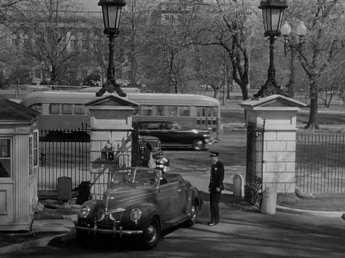


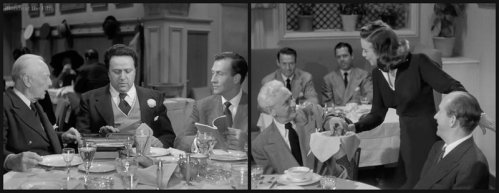
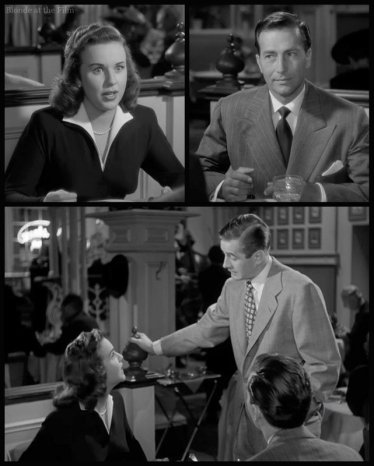
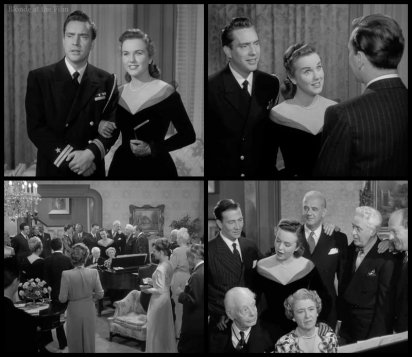

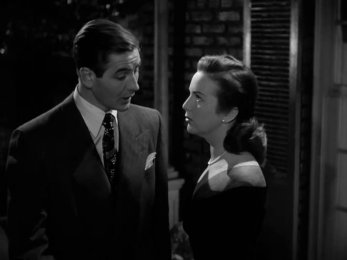




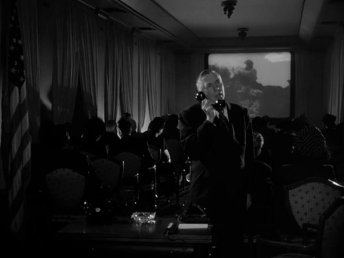
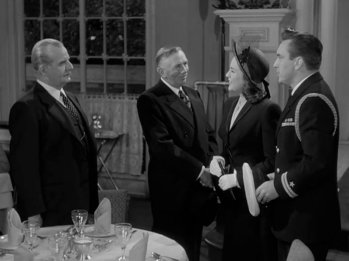
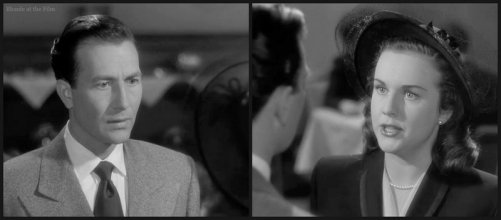
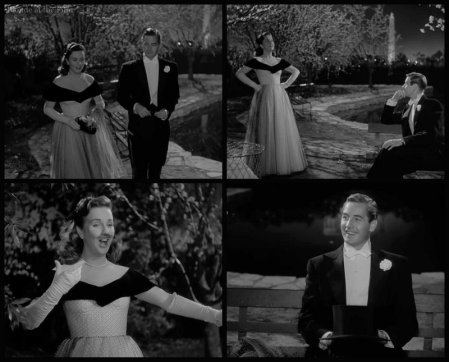


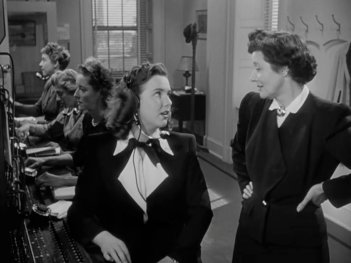


Oh! This movie sounds all over the place but I might watch it because I LOVE Hugo Haas! He’s a famous Czech actor who emigrated to the US and I’ve never seem him in any American movies!
That’s so cool! Thanks for letting me know!
At least it wasn’t entitled “Washington Call Girl”!😜
Ha! You’re right!
One of those movie scripts that seems to rely too much on quirky proper nouns. Peppertree! Cocopango! They’re funny, right? Funny!
An entertaining writeup, no doubt. But to me, Durbin just seems too smug to bother with.
Absolutely about the proper nouns! And Durbin is incredibly smug in this film…
The description alone almost made my eyes cross. And yes, you’re right–it’s possible Mary would be feted if her father was a big shot, but a security guard? And she’s a switchboard operator? Help. My brains is melting into regions unknown.
I suffered a similar disconnect just last night, and not because the plot was disjointed, either. Make that plots, plural, as I was attempting to watch two Leslie Howard films back to back.
The first: The Scarlet Pimpernel, which at least has the promise of a decent ending tied up in a way that makes sense to all and sundry. The second: Intermezzo, another Leslie Howard vehicle, and incidentally Ingrid Bergman’s American debut. Pimpernel is a historical melodrama with anti-fascist overtones. Intermezzo is a straight-up romantic melodrama (thank you, David O. Selznick!) set against the backdrop of the rigors and strains of a career–or careers–in classical music. The main reason I’m on a Leslie Howard kick at all is because of The Petrified Forest, which I initially decided to watch because it was Humphrey Bogart’s big breakout role (and because of Bette Davis, whom I adored as a teenager). I tried watching the 1936 Romeo and Juliet. I had to quit about halfway through precisely because I knew the story so well, although it must be said that watching Howard’s face and the emotions that seemed to flash through him like sheet lightning were and are a pleasure to watch. Meantime I’m trying to avoid Gone With the Wind for as long as possible–I tried watching it as a teenager and watching the rigors of the Civil War strip the veneer off of Ashley Wilkes’s essential fragility was painful to watch even then. Now I have a bone to pick with my local library, as Leslie Howard was a wonderful actor, he deserves to be known for roles outside of that of Ashley Wilkes–and it doesn’t hurt that he was easy on the eyes, either.
Back to For The Love of Mary. It would be more believable, I think, if the writers tried to shoehorn some logic into the story from the start. But they didn’t, and so, here we are. Wonderful post, as usual!
Love your comments on Leslie Howard! I hope you keep enjoying/suffering through your list! He was tremendous. Thanks for reading and commenting!
As always, a pleasure. He was tremendous, wasn’t he? And what a list it is–just looking at it makes me mop my brow ever so little.
I dismissed Leslie Howard out of hand when I was younger in part because of Gone With the Wind. His character’s inherent fragility was painful to watch, as I said, after that good ol’ boy veneer was stripped away. He shattered like glass–which tells you how good any actor had to be to land the part!
After I watched The Petrified Forest, I couldn’t help noticing these unguarded moments of beautiful stillness, raw naked emotion playing over that funny, sensitive face–something that even now seems contemporary to me. (Eat your heart out, Tom Hiddleston.) In Pimpernel he proved himself capable of going about in drag as an old woman. This isn’t strictly necessary to an actor’s repertoire, but somehow Howard nailed it here. In Intermezzo I loved watching the dreamy, pensive look on his face as his character took up the violin to play.
It used to be I picked a favorite actor via hair color, albeit unconsciously–this resulted in a disproportionate number of brunet actors on my personal roster. I have tried to drop this in recent years. It works. I now like blonds, brunets, and redheads, and at the moment Leslie Howard is one of my favorites. On to the next evening of enjoyment and suffering!
I do wonder if Crowther had something specific in mind when he called the movie “a sly piece of propaganda.” If there was something about Truman (who was up for reelection that November) or the Supreme Court that was being picked on? According to Wikipedia, “Truman was one of the most unpopular chief executives in history. His job approval rating of 22% in the Gallup Poll of February 1952 was lower than Richard Nixon’s 24% in August 1974, the month that Nixon resigned.” If a movie about a belligerant, toupee’d President who spent a lot of time on twitter came out today, we’d all get the joke, but maybe in 70 years no one would. I find myself thinking of Truman’s “The Buck Stops Here” slogan, and maybe the possibility that he was seen as a micro-manager in some quarters.
This is all sheer speculation, of course. Thanks for the review!
Ooh that’s interesting! Great point! Thanks for reading!
I haven’t seen this film in donkey’s years, but I remember not enjoying it as much as Durbin’s other pictures….except for her rendition of “It’s a Big Wide Wonderful World”. I think it is quite acceptable to see the possibilities in a film that isn’t to your liking by imagining how it could have been done better. Actually, it should be encouraged, it exercises the viewer’s artistic creativity and allows you to judge whether a scene was done really well or could have been improved upon.
Thanks for this comment! I agree, so long as you don’t go too far…for example, I’m not sure it is fair for me to wish that a late 1940’s Deanna Durbin vehicle was more like a 1930s screwball film. As you say, great to judge whether “a scene was done really well,” but not great to discount a movie just because you wish it was something else entirely!
Durbin was a unique talent and she has tons of appeal to spare, but Universal just kept putting her in movies with lousy scripts. Too bad she didn’t go to MGM like Pasternak begged her to do. She was Lerner and Lowe’s first choice for Eliza in “My Fair Lady,” but she had had it. Our loss because with the right vehicle she was enormously appealing.
Great point! Would have been fun to see her in “My Fair Lady!”